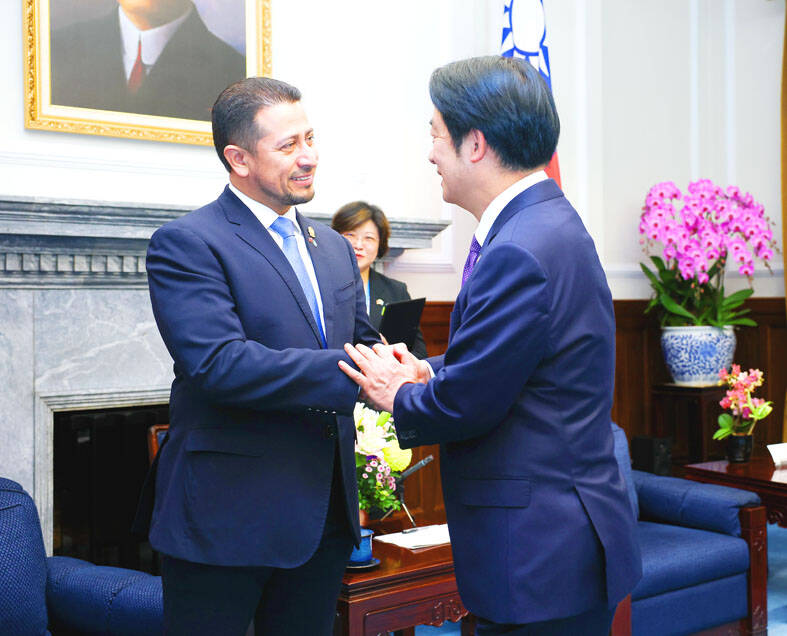President William Lai (賴清德) yesterday thanked Guatemalan Congress President Nery Abilio Ramos y Ramos for his country’s continued support for Taiwan’s participation in international bodies.
Lai and Minister of Foreign Affairs Lin Chia-lung (林佳龍) met with Ramos and his delegation yesterday morning at the Presidential Office in Taipei.
Ramos has signed pro-Taiwan resolutions on behalf of the Guatemalan Congress and issued a statement rejecting China’s misinterpretation of UN Resolution 2758.

Photo: CNA
Beijing has cited the resolution as settling its claims over Taiwan. However, the resolution, adopted by the UN General Assembly in 1971, only recognized the People’s Republic of China as “the only lawful representatives of China,” and makes no mention of Taiwan.
The Guatemalan Congress this year passed two legislative resolutions, one from the board of directors and one from the speaker, calling on the UN to recognize Taiwan’s right to participate in multilateral institutions and organizations.
Lai also expressed his condolences after a series of earthquakes struck Guatemala over the past few weeks.
Guatemala has been an important partner of Taiwan for the past 90 years, with bilateral cooperation in areas from healthcare to industry, and education to women’s empowerment, Lai said.
Guatemala first established ties with the Republic of China in 1934.
Lai said he hoped that the two sides would continue to uphold the values of democratic freedom, and promote regional and global prosperity and development.
Ramos visited Taiwan in July last year, when he discussed possibilities of enhancing bilateral cooperation.
One year later, Ramos again led a cross-party congressional delegation to Taiwan, demonstrating the Central American country’s continued support for Taiwan and further bolstering the nations’ long-standing friendship, Lai said.
Guatemalan President Bernardo Arevalo visited Taiwan last month, during which he and Lai signed a memorandum of understanding aimed at boosting cooperation in semiconductors to help Guatemala’s microchip sector.
They also signed a memorandum of understanding to establish a framework for political consultations, which would ensure regular strategic coordination on key issues.
Taiwan continues to provide semiconductor training and specialized technical programs, while encouraging Taiwanese businesses to choose Guatemala as a strategic base for overseas markets, Lai said.
Ramos said that the relationship between Taiwan and Guatemala is a model for long-term friendship and cooperation amid an increasingly complex global landscape.
This visit aims to continue discussions to deepen cooperation in fields such as the economy, technology, agriculture and culture, he said.

The Philippines is working behind the scenes to enhance its defensive cooperation with Taiwan, the Washington Post said in a report published on Monday. “It would be hiding from the obvious to say that Taiwan’s security will not affect us,” Philippine Secretary of National Defense Gilbert Teodoro Jr told the paper in an interview on Thursday last week. Although there has been no formal change to the Philippines’ diplomatic stance on recognizing Taiwan, Manila is increasingly concerned about Chinese encroachment in the South China Sea, the report said. The number of Chinese vessels in the seas around the Philippines, as well as Chinese

‘A SERIOUS THREAT’: Japan has expressed grave concern over the Strait’s security over the years, which demonstrated Tokyo’s firm support for peace in the area, an official said China’s military drills around Taiwan are “incompatible” with peace and stability in the Taiwan Strait, Japanese Minister of Foreign Affairs Takeshi Iwaya said during a meeting with his Chinese counterpart Wang Yi (王毅) on Thursday. “Peace and stability across the Taiwan Strait is important for the international community, including Japan,” Iwaya told Wang during a meeting on the sidelines of the ASEAN-related Foreign Ministers’ Meetings in Kuala Lumpur. “China’s large-scale military drills around Taiwan are incompatible with this,” a statement released by the Japanese Ministry of Foreign Affairs on Thursday cited Iwaya as saying. The Foreign Ministers’ Meetings are a series of diplomatic

URBAN COMBAT: FIM-92 Stinger shoulder-fired missiles from the US made a rare public appearance during early-morning drills simulating an invasion of the Taipei MRT The ongoing Han Kuang military exercises entered their sixth day yesterday, simulating repelling enemy landings in Penghu County, setting up fortifications in Tainan, laying mines in waters in Kaohsiung and conducting urban combat drills in Taipei. At 5am in Penghu — part of the exercise’s first combat zone — participating units responded to a simulated rapid enemy landing on beaches, combining infantry as well as armored personnel. First Combat Zone Commander Chen Chun-yuan (陳俊源) led the combined armed troops utilizing a variety of weapons systems. Wang Keng-sheng (王鏗勝), the commander in charge of the Penghu Defense Command’s mechanized battalion, said he would give

‘REALISTIC’ APPROACH: The ministry said all the exercises were scenario-based and unscripted to better prepare personnel for real threats and unexpected developments The army’s 21st Artillery Command conducted a short-range air defense drill in Taoyuan yesterday as part of the Han Kuang exercises, using the indigenous Sky Sword II (陸射劍二) missile system for the first time in the exercises. The armed forces have been conducting a series of live-fire and defense drills across multiple regions, simulating responses to a full-scale assault by Chinese forces, the Ministry of National Defense said. The Sky Sword II missile system was rapidly deployed and combat-ready within 15 minutes to defend Taiwan Taoyuan International Airport in a simulated attack, the ministry said. A three-person crew completed setup and